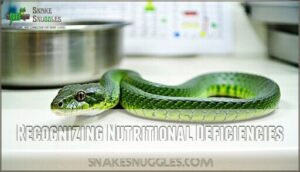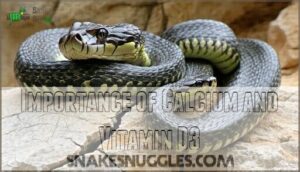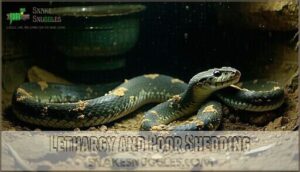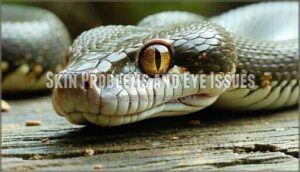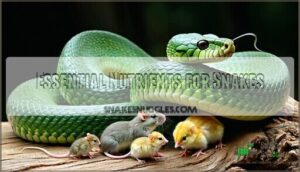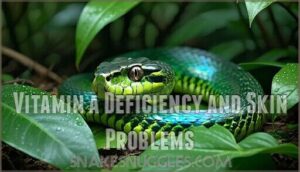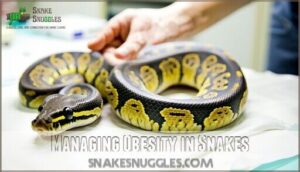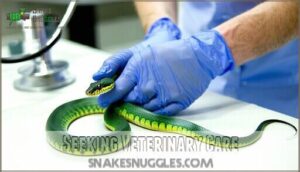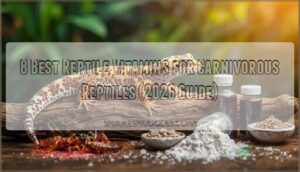This site is supported by our readers. We may earn a commission, at no cost to you, if you purchase through links.

Common issues include calcium and vitamin D3 shortages, leading to metabolic bone disease—like osteoporosis but for your scaly friend.
Your snake needs proper nutrients from varied prey items and sometimes supplements dusted on their meals.
Think of their diet like a puzzle—each piece matters for overall health.
Proper lighting also plays a key role, as snakes need UVB to process certain vitamins properly.
The right nutrition can mean the difference between a thriving pet and expensive vet bills down the road.
Table Of Contents
- Key Takeaways
- Recognizing Nutritional Deficiencies
- Causes of Nutritional Deficiencies
- Importance of Calcium and Vitamin D3
- Vitamin Deficiency Signs and Symptoms
- Essential Nutrients for Snakes
- Preventing Nutritional Deficiencies
- Treating Nutritional Deficiencies
- Common Vitamin Deficiencies
- Managing Obesity in Snakes
- Seeking Veterinary Care
- Frequently Asked Questions (FAQs)
- Do snakes have a vitamin deficiency?
- What vitamins do snakes need?
- What nutrients do snakes eat?
- Do snakes need a balanced diet?
- Is a snake diet bad for You?
- Do snakes need vitamin D?
- What are the symptoms of malnutrition in reptiles?
- What is the most common nutritional problem seen in reptiles?
- What are the symptoms of vitamin A deficiency in reptiles?
- What is the most nutritious food for snakes?
- Conclusion
Key Takeaways
- You’ll recognize nutritional deficiencies in your snake through key signs like poor shedding, lethargy, bone deformities, and dull eyes—catch these early to prevent serious health complications.
- Your snake needs proper calcium and vitamin D3 balance for bone health, which requires both appropriate supplements and UVB lighting for calcium absorption and processing.
- You’ll prevent most nutritional problems by offering whole prey items rather than just muscle meat, ensuring your snake gets a complete nutritional profile.
- You should establish regular veterinary check-ups that include blood work to detect deficiencies before visible symptoms appear, as early intervention dramatically improves treatment outcomes.
Recognizing Nutritional Deficiencies
You’ll want to recognize the signs of nutritional deficiencies in your snake, such as weight loss, dull eyes, and poor shedding.
By catching these signs early, you can take action to fix the issue and guarantee your snake stays healthy and thriving.
Signs of Malnutrition in Snakes
Watch for signs of malnutrition in your snake, like weight loss, dull eyes, poor shedding, and appetite loss.
Slow growth and lethargy can also indicate snake nutritional deficiencies, so monitor your pet’s health closely to catch reptile malnourishment symptoms early.
Be especially vigilant for signs like soft jaws and lethargy, which can indicate a calcium deficiency.
Common Vitamin and Mineral Deficiencies
Captive snakes commonly face four nutritional shortfalls that every owner should recognize:
- Vitamin A deficiency leads to eye infections and poor skin health
- Calcium deficiency causes metabolic bone disease and skeletal deformities
- Vitamin E deficiency results in muscle damage and weakness
- Mineral imbalances trigger irregular shedding and stunted growth
Hypovitaminosis C and thiamine deficiency are less common but equally concerning.
Regular supplements and proper feeding prevent these issues without breaking the bank.
Overfeeding and Obesity Issues
Despite their slow metabolism, snakes can become overweight.
Obesity risks in captive snakes include fatty liver disease, reduced lifespan, and reproductive problems.
Implement proper portion control by offering appropriately sized prey—no wider than your snake’s midsection.
Establish a consistent feeding schedule based on species and age, and you’ll prevent health complications by monitoring weight and adjusting meal frequency, ensuring your snake maintains ideal body condition through proper portion control.
Causes of Nutritional Deficiencies
You’re likely harming your snake’s health with a limited diet of immature prey and incorrect lighting setup.
Your snake needs whole prey items with proper minerals and adequate UVB exposure to prevent serious calcium and vitamin deficiencies.
Poor Diet and Lack of UVB Lighting
After recognizing nutritional problems in your snake, it’s important to address their root causes.
Poor diet choices and missing UVB lighting are major culprits behind snake nutritional deficiencies.
When you only offer incomplete prey or lack diet variety, your pet misses essential nutrients.
Without proper UVB exposure, snakes can’t process calcium correctly, leading to snake calcium deficiency.
Snakes also benefit from enhanced immune function when exposed to UVB.
UVB alternatives exist, but they can’t fully replace natural light benefits.
Inadequate Calcium and Vitamin D3
While UVB lighting affects overall snake health, calcium and vitamin D3 deficiencies are at the root of many serious problems.
Your snake’s bone health depends on a proper mineral balance – calcium can’t be properly absorbed without vitamin D3.
Without both, snake metabolic bone disease can develop, causing weak, brittle bones and deformities.
Diet formulation should include calcium supplements dusted on prey items, especially for growing snakes, to prevent calcium deficiencies.
Many owners don’t realize that even with calcium supplementation, without proper UVB lighting, your snake can’t process these nutrients effectively.
Thiamine Deficiency and Incorrectly Prepared Fish
While you’ve tackled calcium concerns, thiamine deficiency lurks when fish are incorrectly prepared for your snake’s diet.
Many fish contain thiaminase, an enzyme that breaks down thiamine (vitamin B1).
This deficiency causes neurological symptoms in snakes, especially those fed raw marine fish.
Always cook fish thoroughly to inactivate thiaminase or supplement with thiamine.
Better yet, stick with whole prey items like mice or rats.
For fish-eating snake species, proper preparation isn’t just good practice—it’s essential for preventing serious health complications, which can be avoided with proper preparation.
Importance of Calcium and Vitamin D3
You’ll need calcium and vitamin D3 to keep your snake’s bones strong and prevent painful metabolic bone disease.
Your snake can’t make these nutrients on its own, so you’ll need to provide them through proper diet and supplements, just like how we humans need milk for our bones to stay healthy with vitamin.
Role of Calcium in Snake Health
Calcium forms the foundation of your snake’s skeletal health, protecting against metabolic bone disease and ensuring proper development.
- Snake calcium deficiency leads to weak, brittle bones
- Proper calcium absorption supports essential muscle function
- Dietary calcium must maintain the correct calcium-to-phosphorus ratio
- Regular calcium supplementation prevents reptile calcium deficiency
Without adequate calcium, your snake may develop serious health problems, including metabolic bone disease. Watch for early signs like tremors and softened jawbones to prevent snake metabolic bone disease, which can be avoided with proper calcium supplementation.
Importance of Vitamin D3 in Calcium Absorption
Without vitamin D3, calcium is virtually useless in your snake’s body – it’s like having keys but no lock to open.
This essential relationship affects your snake’s overall bone health and development.
For proper calcium metabolism in snakes:
- D3 Synthesis Process: UVB lighting triggers vitamin D3 production in your snake’s skin, enabling calcium absorption from the digestive tract
- Metabolic Pathway: D3 converts to calcitriol, which activates calcium transport proteins
- Prevention Benefits: Adequate D3 helps avoid metabolic bone disease, preventing the weak, rubbery bones that can devastate your reptile
Choosing The Right Calcium Supplement
Now that you understand how vitamin D3 helps with calcium absorption, let’s pick the right supplement for your snake.
Most snakes actually don’t need calcium supplements if they’re eating whole prey with bones. The calcium-to-phosphorus ratio is usually perfect in their natural diet.
If supplementation is needed, powdered calcium carbonate works better than liquid forms. You can find calcium D3 powder online.
For breeding females, occasional dusting of prey with calcium powder (with D3) can support egg production. Always follow dosage guidelines to avoid overdoing it.
Vitamin Deficiency Signs and Symptoms
You’ll spot vitamin deficiencies in your snake when it shows dull eyes, poor shedding, or moves slowly around its enclosure.
Your scaly friend might also develop weak bones or weird skin problems that won’t clear up with normal care, signaling it’s time for a nutritional tune-up.
Lethargy and Poor Shedding
Your snake moving like molasses? Lethargy and poor shedding are key warning signs of nutritional deficiencies.
When your pet’s energy levels drop and skin health deteriorates, vitamins might be missing.
Three environmental factors often contribute:
- Low hydration levels
- Improper enclosure humidity
- Vitamin A or D3 deficiency
Don’t wait – these symptoms can quickly progress to serious health issues.
Your reptile depends on you for proper nutrition.
Bone Deformities and Muscle Weakness
While we observed lethargy affecting your snake’s activity, physical deformities tell an even clearer story.
Bone deformities and muscle weakness often signal calcium deficiency or vitamin D3 deficiency in your reptilian friend.
You’ll notice skeletal abnormalities like twisted spines, soft jawbones, or rubbery limbs.
Progressive weakness may make your snake move awkwardly or struggle to lift its body.
Without proper calcium absorption, these symptoms worsen over time.
D3 supplementation is vital, as this vitamin helps your snake utilize calcium effectively.
Think of it as the key that activates calcium’s benefits, preventing muscle atrophy and keeping your snake’s structure sound.
Skin Problems and Eye Issues
While bone issues affect your snake’s structure, skin and eye problems visibly signal vitamin deficiencies. Dull eyes, cloudy appearance, and skin nodules often indicate vitamin A deficiency, causing squamous metaplasia in severe cases.
Watch for these warning signs:
- Poor shedding with retained patches
- Eye discharge or swollen lids
- Skin infections around mouth or scales
- Discolored patches that don’t improve with shedding
Fix these problems early with proper nutrition to prevent complications, and address the issue of skin nodules to ensure your snake’s health.
Essential Nutrients for Snakes
Your snake needs specific nutrients including calcium, vitamins A, D3, and E to prevent serious health problems that can sneak up on you like a silent predator.
You’ll find that providing whole prey items rather than just muscle meat guarantees your scaly friend gets the complete nutrition they need for proper growth and shedding.
High Temperatures for Digestion
After exploring vitamin deficiency symptoms, let’s talk temperature – your snake’s digestive powerhouse!
Your pet needs heat to break down food properly.
Without ideal temperatures (75-90°F for most species), digestion slows dramatically, preventing nutrient absorption.
Setup multiple heat sources like basking spots and under-tank heaters to create a temperature gradient.
This behavioral thermoregulation lets snakes adjust their metabolism naturally.
Proper humidity aids digestion.
Cold snakes = hungry snakes, even with full bellies!
Importance of Vitamin a and UVB Lighting
Every snake needs proper lighting to thrive.
UVB lighting works together with Vitamin A to support your pet’s health.
- UVB promotes natural D3 synthesis
- Proper lighting placement prevents nutritional deficiencies
- Vitamin A sources like rodents help prevent eye problems
- Correct UVB spectrum reduces supplementation risks
- Regular exposure prevents common reptile nutritional deficiencies
Without adequate lighting, your snake may develop shedding issues and vitamin A deficiency.
Many keepers buy snake UVB lighting from online retailers.
Think of UVB as sunshine in a bottle for your scaly friend, providing essential support for your pet’s overall health, including the prevention of shedding issues and the promotion of natural D3 synthesis.
Trace Minerals for Healthy Skin and Scales
While proper UVB lighting supports vitamin production, trace minerals are the hidden heroes of snake health.
These micronutrients directly impact your snake’s beautiful scales.
| Mineral | Function | Deficiency Signs |
|---|---|---|
| Zinc | Scale formation & immune support | Dull, flaky scales |
| Copper | Pigmentation & connective tissue | Poor coloration |
| Selenium | Antioxidant protection | Slow healing |
| Manganese | Enzyme activation | Irregular shedding |
Just like humans need minerals, your snake’s skin health depends on these tiny but mighty nutrients. Your snake’s skin health is also dependent on proper care.
Preventing Nutritional Deficiencies
You’ll prevent most nutritional problems in your snake by offering whole prey items and setting up proper UVB lighting.
Regular vet check-ups and careful monitoring of your snake’s eating habits will catch any issues before they turn your slithery friend into a sad noodle.
Providing a Balanced Diet
After looking at essential nutrients, let’s talk about keeping your snake well-fed.
A balanced diet is your best defense against snake nutritional deficiencies.
Here’s how to nail it:
- Offer whole prey variety—mice, rats, chicks, and quail provide different nutritional profiles
- Follow a consistent feeding schedule based on your snake’s age and species
- Practice supplement dusting by coating prey items with calcium and vitamins before feeding
Don’t overfeed! A proper snake diet should include appropriately-sized prey items that match your reptile’s nutritional requirements. Your scaly friend will thank you!
Ensuring Proper Hygiene and Sanitation
While providing proper nutrition forms the foundation of snake health, maintaining impeccable hygiene is equally important in preventing nutritional deficiencies.
A clean enclosure prevents bacteria that can interfere with nutrient absorption.
Regular waste removal and disinfecting surfaces eliminate harmful pathogens that could cause digestive issues.
Fresh, clean water supports proper hydration and metabolism.
Thorough enclosure cleaning helps prevent parasites that can steal nutrients from your snake, potentially causing reptile nutritional disorders like calcium deficiency that affect skin and eyes.
Regular Check-Ups With a Veterinarian
Beyond keeping your snake’s home clean, regular visits to a reptile vet are your best defense against nutritional problems.
Regular vet visits protect your snake’s health
These check-ups enable early detection of snake nutritional deficiencies before they become serious health concerns.
Your vet provides expert advice on dietary adjustments based on health monitoring during screenings, think of preventative care as an investment—it’s much easier to prevent deficiencies than to treat them once they’ve damaged your snake’s health, considering it as an investment and a means to avoid serious health concerns.
Treating Nutritional Deficiencies
You’ll need to act quickly to fix your snake’s nutritional problems by correcting their diet and adding the right supplements.
When you catch deficiencies early, most snakes bounce back like rubber bands, so don’t wait until your scaly friend starts showing serious symptoms, and take immediate action to address the issue with complete concepts in mind.
Addressing Underlying Causes
Now that you know how to prevent problems, let’s identify what’s causing your snake’s nutritional troubles.
To fix snake nutritional deficiencies, you’ll need to play detective.
Is your snake getting enough UVB provision?
Does its diet lack diversity?
Poor hygiene practices can also block food absorption.
Snake anorexia causes often hide in plain sight – stress from improper handling, incorrect temperatures, or limited hiding spots.
Regular vet checkups help spot reptile dietary needs you might miss.
Remember, portion control matters too – both overfeeding and underfeeding create problems.
Administering Supplements and Medications
With treatment causes identified, it’s time for action with supplements and medications. You’ll need to give your snake targeted support.
- Mix vitamin powder into water for oral syringe administration
- Dust prey items with calcium supplement before feeding
- Apply topical ointments directly to affected skin areas
- Use injectable calcium gluconate for severe deficiencies (vet only)
- Store supplements in cool, dry places to maintain potency
Remember, accurate dosage is critical. Too much calcium can be as harmful as too little. Your vet can demonstrate proper handling techniques for medication administration, making treatment less stressful for both you and your snake.
Monitoring Progress and Adjusting Treatment
Every successful treatment plan requires vigilant monitoring.
Track your snake’s progress weekly with these key indicators:
- Weight measurements (using a digital scale)
- Shedding quality improvements
- Energy levels and movement patterns
- Feeding response times
Adjust supplement dosages based on treatment efficacy and behavioral changes.
Document everything in a simple log, noting when supplements were given.
Regular vet checkups with blood work guarantee long-term health and proper nutritional assessments.
Common Vitamin Deficiencies
You’ll notice vitamin deficiencies in your snake through specific signs like dull scales, poor shedding, and unusual behavior.
Common culprits include lack of vitamins A, D3, and E, which can lead to problems ranging from skin issues and weak bones to muscle weakness that affects your slithery friend’s quality of life.
Vitamin D3 Deficiency and Metabolic Bone Disease
While your snake may seem healthy, vitamin D3 deficiency can silently weaken their bones.
Without proper D3 supplementation and UVB exposure, metabolic bone disease develops, reducing bone density and causing deformities.
Your snake’s skeleton literally softens when dietary calcium can’t be absorbed properly.
NSHP treatment requires immediate vet attention for snake bone health.
It is crucial to address metabolic bone disease and ensure proper calcium supplementation to prevent long-term damage.
Vitamin a Deficiency and Skin Problems
Within your snake’s body, Vitamin A deficiency often manifests through concerning skin problems.
You’ll notice changes that signal something’s wrong:
- Dull, flaky patches developing into serious skin lesions
- Incomplete shedding with stuck patches causing constriction
- Squamous metaplasia leading to thickened, abnormal skin
- Eye problems including swollen lids and discharge
- Hyperkeratosis creating hardened skin that cracks easily
These symptoms can progress to respiratory infections if left untreated.
Snake nutritional deficiencies, particularly snake vitamin A deficiency, require prompt attention.
Feed your snake vitamin A-rich prey like liver or use appropriate supplements.
Don’t wait until skin problems become severe—early intervention prevents complications.
Vitamin E Deficiency and Muscle Weakness
When your snake’s muscles tremble like jelly, vitamin E deficiency might be causing muscle degeneration. This antioxidant role protector gets depleted from fatty fish diets or obese rodents.
Watch for skin nodules and weakness. Avoid supplementation risks by giving 1 iu/kg dosage carefully.
| Symptom | Action Needed |
|---|---|
| Muscle tremors | Start vitamin E supplements |
| Skin nodules appearing | Check diet for oily fish |
| Weakness spreading | Veterinary exam required |
| Poor coordination | Reduce fatty prey items |
| Breathing difficulties | Emergency vet visit |
Managing Obesity in Snakes
You might think your snake’s just well-fed, but that round belly could signal a serious health problem that’s shortening its life.
Managing obesity in snakes requires careful attention to feeding schedules and portion sizes, since overweight serpents face increased risks of heart disease, breathing problems, and shorter lifespans, which can be a serious health problem.
Signs of Obesity in Snakes
Spotting snake obesity isn’t rocket science, but it requires a keen eye.
Your snake’s scale folding and fat rolls are dead giveaways that something’s off.
Notice how your pet’s once-sleek silhouette now resembles a round body with that telltale squishy texture?
That’s excessive fat talking.
Watch for these warning signs:
- Scale gaping between individual scales
- Reduced activity and sluggish movement
- Distorted body shape losing natural curves
- Organ stress affecting digestion and breathing
Adjusting Diets for Snakes With Nutritional Deficiencies
Now that you’ve spotted the signs, it’s time for dietary adjustments.
Start with prey variety – offer lean options like appropriately-sized rats instead of fatty mice. Supplement strategies matter too: dust prey with calcium powder weekly, but don’t overdo it.
Hydration importance can’t be ignored – make certain fresh water’s always available. Make gradual changes over several feedings to avoid stress.
Snake nutritional deficiencies respond well to these snake diet adjustments when you’re patient and consistent with your approach.
diverse, lean prey
Gut-Loading Prey
Supplement Options
Feeding Frequency and Portion Control
Getting your snake’s diet right prevents more problems than you’d think. Obesity Prevention starts with understanding that your pet’s Feeding Schedule isn’t a guessing game.
Monitor your snake’s weight regularly. Adjust the Prey Size based on activity level and species. Set a feeding routine that matches your snake’s age and growth rate.
Here’s your roadmap for snake feeding frequency and portion control:
- Feed adult snakes every 10-14 days depending on species
- Choose prey that’s 10-15% of your snake’s body weight
- Avoid Regurgitation Risks by waiting 3 days before handling
- Consider Force-Feeding Alternatives like scenting new prey items
- Track feeding dates to maintain consistent snake diet adjustments
This snake proper diet approach keeps your slithery friend healthy and happy.
Nutrient-Rich Prey and Supplements
Now that you’ve mastered portion control, let’s talk about what’s on your snake’s plate.
Whole prey offers complete nutrition, but quality matters.
You’ll get better results by gut loading insects before feeding or dusting prey with calcium supplements. For ideal health, consider using snake calcium supplements.
For frozen prey over three months old, add vitamin E supplements. Variety is key—mix up your snake’s diet with different prey types rather than relying on a single food source.
Snake supplements aren’t always necessary if you’re offering nutritionally balanced, whole vertebrate prey.
Seeking Veterinary Care
You can’t fix snake nutritional problems with guesswork, so call your reptile vet at the first sign of trouble.
Your scaly friend can’t tell you what’s wrong, but a vet can run tests to spot vitamin or mineral deficiencies before they become serious health issues.
Recognizing Signs of Illness
In the battle against snake nutritional deficiencies, recognizing illness early gives you the upper hand.
Watch for these Early Symptoms:
- Behavioral Changes – Unusual lethargy or hiding more than normal
- Physical Indicators – Dull scales, stuck shed, or visible weight loss
- Feeding Issues – Reduced appetite or complete refusal of food
- Respiratory Signs – Wheezing, bubbling around nostrils, or open-mouth breathing
Don’t wait until these snake health issues worsen.
Consulting a Veterinarian for Regular Check-Ups
Regular vet checkups are essential for your snake’s wellbeing.
A reptile vet can spot nutritional deficiencies before symptoms appear.
Aim for twice-yearly visits—more for juveniles or seniors.
These preventative care appointments allow for early detection of health issues through visual assessments.
Expert advice from a qualified veterinarian guarantees proper nutrition and prevents common problems.
Don’t wait until your snake shows illness; consistent checkups are key to longevity.
Regular fecal analysis can also help in identifying internal and external parasites to ensure your snake’s overall wellbeing.
Blood Work and Nutritional Assessments
Blood work gives your vet a window into your snake’s nutritional status.
For accurate diagnostic results, vets draw only safe amounts—about 10% of total blood volume (0.5-0.8mL for a 100g snake).
Here’s what blood tests reveal:
- Baseline values for future comparison
- Early detection of deficiencies
- Effectiveness of current supplementation
- Hidden health issues before symptoms appear
- Need for dietary adjustments
These assessments help prevent snake nutritional deficiencies before they become serious problems, ensuring the effectiveness of current supplementation and the need for dietary adjustments.
Frequently Asked Questions (FAQs)
Do snakes have a vitamin deficiency?
Yes, snakes can develop vitamin deficiencies.
You’ll notice signs like poor shedding, dull eyes, and lethargy if they’re lacking vitamins A, D3, E, or calcium.
A varied diet helps prevent these problems.
What vitamins do snakes need?
Just like you need a daily vitamin, your snake requires vitamins A, D3, and E for health.
They’ll also need calcium, phosphorus, and trace minerals to keep their bones strong and systems functioning properly.
What nutrients do snakes eat?
Snakes need calcium, phosphorus, vitamins A, D3, and E for healthy bones and tissues. You’ll find these nutrients in whole prey items like mice, rats, and birds they consume naturally.
Do snakes need a balanced diet?
Your snake’s health depends on a balanced diet.
You’ll need to provide proper calcium, vitamins A, D3, and E through varied prey items to prevent deficiencies that can lead to serious health problems.
Is a snake diet bad for You?
Are you slithering down a dangerous path?
A snake diet isn’t good for you as it’s extremely restrictive, lacks essential nutrients, and can cause metabolic issues.
Your body needs balanced nutrition for health.
Do snakes need vitamin D?
Yes, they do need vitamin D.
Your snake requires vitamin D3 for calcium absorption and bone health.
Without it, they’ll develop skeleton disorders, decreased growth, and muscle weakness, especially affecting gravid females and young snakes, leading to serious health issues related to bone health.
What are the symptoms of malnutrition in reptiles?
When Milo’s bearded dragon stopped shedding properly, it was a warning sign.
You’ll notice weight loss, sluggish behavior, dull eyes, poor shedding, and appetite loss if your reptile isn’t getting proper nutrition.
What is the most common nutritional problem seen in reptiles?
The most common nutritional problem you’ll see in reptiles is calcium deficiency, often paired with vitamin D3 insufficiency.
This combination leads to metabolic bone disease, causing weak bones and skeletal deformities in your pet.
What are the symptoms of vitamin A deficiency in reptiles?
Ever noticed your reptile’s skin looking unusually scaly?
Vitamin A deficiency causes swollen eyelids, reduced appetite, respiratory infections, poor shedding, and thickened skin.
You’ll also see eye problems and compromised immune function.
What is the most nutritious food for snakes?
Whole prey items like mice and rats provide the most complete nutrition for your snake.
They offer balanced calcium, phosphorus, and essential vitamins naturally packaged exactly as your snake’s digestive system evolved to process.
Conclusion
Ultimately, addressing snake nutritional deficiencies isn’t rocket science—it’s actually much more rewarding!
You’ll witness your slithery companion thrive with proper calcium, vitamin D3, and varied prey items.
Remember, the warning signs we’ve covered demand immediate action, not tomorrow or next week.
With consistent lighting, balanced supplements, and regular vet check-ups, you’re setting your snake up for a long, healthy life.
Your vigilance today prevents severe health issues tomorrow, making proper nutrition your most powerful tool against snake nutritional deficiencies.

